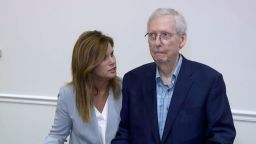Editor’s Note: Jay Newton-Small is founder of MemoryWell, a digital platform that brings professional journalism skills to the challenge of helping elders tell their life stories. She is a contributor to TIME and the author of “Broad Influence: How Women Are Changing the Way America Works.” The views here are solely hers. View more opinion articles on CNN.
A few years after my father’s Alzheimer’s diagnosis, his neurologist reported him to the state of Florida, and he was required to go in for regular driving tests until one day, about 18 months later, he failed his test and was never allowed to drive again.

Almost every state in the union has laws requiring retesting of drivers when a doctor (or in some cases a family member) reports them to be cognitively or physically impaired. Some professions, notably airline pilots, require cognitive testing, but in politics the only cognitive screening seems to come from partisan pundits.
In watching some of our aging politicians, I have often wondered: Why isn’t there a similar test for them?
Our aging leaders are increasingly being criticized (often, though not always, by their opponents) as “too old” for the job. If 2024 shapes up to be a rematch between President Joe Biden and former President Donald Trump, on Election Day they will be the two oldest party nominees in history, at 81 and 78 respectively. In the Senate, two key positions are filled by elderly politicians who have already suffered recent health complications: Senate Judiciary Chair Dianne Feinstein (90) and Senate Minority Leader Mitch McConnell (81).
Questions about McConnell’s fitness for office took center stage again on Wednesday, when he seemed to freeze in front of the press and was unable to respond to questions about running for reelection. It was the second such freezing incident in recent weeks, episodes that his staff have attributed to dehydration and lightheadedness. He also suffered a concussion after a fall earlier in the year.
The US Capitol physician, Dr. Brian Monahan, on Thursday said the minority leader is “medically clear” to continue his official duties and that “occasional lightheadedness is not uncommon in concussion recovery and can also be expected as a result of dehydration.” But there’s no doubt that the speculation about McConnell’s health will continue, and whether he should keep his job.
I have no way of knowing whether McConnell (or Feinstein, who has been hospitalized more than once this year) should still hold office, and I shouldn’t be the person to determine that – the voters should. But I do believe that they should both be more open with their diagnoses and challenges, and that by doing so they will provide voters with the best information to make their decisions. Part of the problem now isn’t just the shaky behavior these figures exhibit, but our lack of knowledge about their conditions and prognoses. A brief statement from the Capitol Hill physician isn’t enough.
It was encouraging for mental health advocates when Pennsylvania Sen. John Fetterman bluntly admitted he wasn’t fit to serve and stepped away temporarily to seek treatment for depression. If only every member of Congress would be so forthcoming with their health struggles. Coming forward and disclosing the diagnosis, offering their doctor’s expectations and submitting to testing to stay in office are the responsible things to do.
Unfortunately, there’s a significant danger that such transparency would result in the weaponizing of cognitive impairment by political enemies. In this climate it’s hard to imagine revealing adverse medical diagnoses stemming from old age without the world’s condemnation coming down like a ton of bricks. And in an era in which we have struggled to agree on the truth of a pandemic and vaccines, parsing a prognosis or agreeing on a cognitive test in a responsible way might be downright impossible. Worst of all, if we say anyone with this disease should be thrown away, we are digging their graves even as we deter them from getting the help they need.
Even outside of the public spotlight of politics, decisions around cognitive decline are fraught. In my own family, my mother hid my father’s Alzheimer’s diagnosis for a decade — until she died of the stress of caring for him and hiding it from the world. She was afraid of the stigma of the disease and she didn’t want to lose all their friends. She knew that my father was the charming one; after her death I found reams of printed pages of jokes she’d been trying to memorize to try to pick up his social mantle.
The truth is my father had eight good years after his diagnosis. The mind doesn’t just switch off after you get dementia. It’s often a slow process. I’ve heard of people living 25 or more years with the condition, many of them positive. At some point, though, my father’s mind did go. Which is why it was great we had a test to help protect others from him driving, and that the bank helped my mother set guard rails on his spending.
Get Our Free Weekly Newsletter
- Sign up for CNN Opinion’s newsletter
- Join us on Twitter and Facebook
My biggest regret is that, while my mother could have had more support, because she hid his disease, she didn’t get that assistance. She had no respite when he followed her around like a puppy, even to the bathroom (a phase called “shadowing.”) She had no one but me to confide in and vent to. I went to group therapy every week and asked the questions she wanted asked, but often the answers came too late or had been posed incorrectly.
For too many, the frailties of age are a source of shame. We are a society that does not tolerate imperfections, weakness and other signs of growing older. Our leaders must set an example: Be transparent about their health issues, submit to regular tests and plan to step away when those tests show they can no longer fulfill the duties of their office. A lot of older Americans are perfectly fit for office, public life and every other endeavor, but to see our leaders falter so publicly only invites concern, speculation and, frankly, ageism. Anything less than this openness is a disservice to their constituents and the millions in our aging society who will grapple with this condition themselves.





